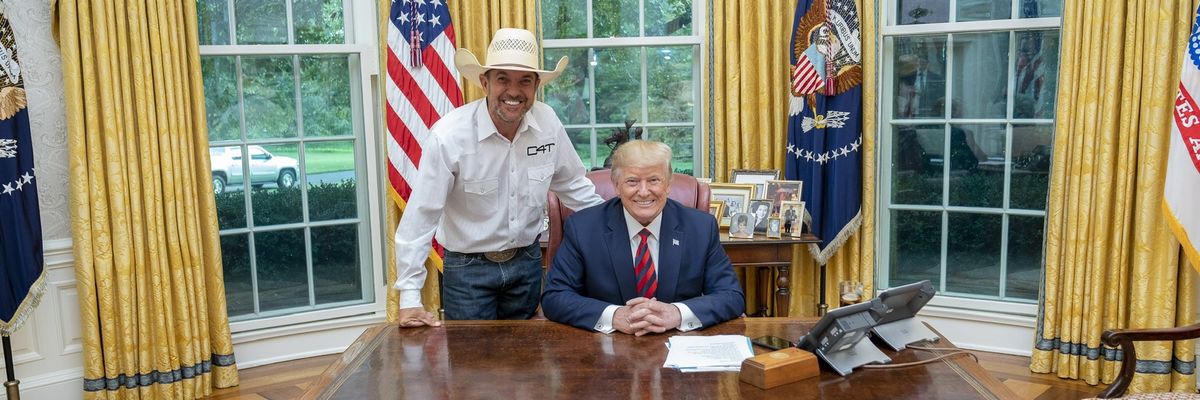Just two weeks after handing former U.S. President Donald Trump a crucial win, the country's Supreme Court on Monday turned down an appeal from the only public official removed from office for participating in the January 6, 2021 insurrection.
The high court—which has a right-wing supermajority that includes three Trump appointees and Justice Clarence Thomas, whose wife backed the Republican's efforts to overturn his 2020 loss—declined to take the case of Couy Griffin, who was booted off the Otero County Commission by a New Mexico court in 2022, after he was convicted of breaching and occupying Capitol grounds.
In response to a lawsuit brought by the watchdog Citizens for Responsibility and Ethics in Washington (CREW) on behalf of New Mexico residents, the state's 1st Judicial District Court removed Griffin from his local post under Section 3 of the 14th Amendment, which bars anyone who has taken an oath to the U.S. Constitution and then engaged in insurrection from holding office.
"By refusing to take up this appeal, the Supreme Court keeps in place the finding that January 6th was an insurrection."
CREW also represented Colorado Republican and Independent voters who recently sought to get Trump—facing off against Democratic President Joe Biden in this year's presidential election—off their state's primary ballot, one of several 14th Amendment battles that emerged before the ongoing primaries. In Trump's case, the court determined that states can't ban federal candidates from ballots.
"We conclude that states may disqualify persons holding or attempting to hold state office," reads the majority opinion in Trump v. Anderson. "But states have no power under the Constitution to enforce Section 3 with respect to federal offices, especially the presidency."
Because of that first line, legal experts stressed, the Griffin denial is actually consistent with the justices' ruling in the Trump case, despite the apparent discrepancy. CREW said Monday that the high court "let Trump off the hook" but the group also welcomed the Griffin decision.
"By refusing to take up this appeal, the Supreme Court keeps in place the finding that January 6th was an insurrection, and ensures that states can still apply the 14th Amendment's disqualification clause to state officials," said CREW president Noah Bookbinder.
"Crucially, this decision reinforces that every decision-making body that has substantively considered the issue has found that January 6th was an insurrection, and Donald Trump engaged in that insurrection," he added. "Now it is up to the states to fulfill their duty under Section 3 to remove from office anyone who broke their oath by participating in the January 6th insurrection."
Griffin said on social media Monday that "I just found out (through the media) that my appeal to the SCOTUS has been denied. Very disappointed. I don't even know what to say. But I thank you for your prayers and for standing with me through this."
Less than an hour later, the Cowboys for Trump co-founder publicly pitched himself as a potential running mate for the presumptive GOP nominee, saying: "Has Donald Trump picked a vice president yet? Would be such an honor to only be considered."
The twice-impeached former president has not yet announced a VP. While Trump has defeated the 14th Amendment effort for now—though a November win could spark another court fight—he faces four ongoing criminal cases, two of which stem from his attempt to overturn the 2020 results. It's not clear if any of those cases will go to trial before the next presidential election.
In a bid to get his federal election interference case—and possibly others—dismissed, Trump is trying to claim presidential immunity. After declining to weigh in early on, the Supreme Court agreed to hear immunity arguments on April 25.
Trump's other election interference case in Fulton County, Georgia has been plagued by controversy involving the district attorney's love life. He also faces a federal case involving classified documents and a New York state case related to hush money.
Also in New York state, Trump, his real estate company, his adult sons, and a former executive were hit with major fines in a civil fraud case last month. His attorneys said in a Monday filing that obtaining a bond for the $464 million judgment—which includes what is owed by Don Jr. and Eric Trump—while he appeals is a "practical impossibility," meaning asset seizure is possible.
